Military Verse as Cultural Asset in Congo-Brazzaville
The low-ceilinged hall of Brazzaville’s Maison des Anciens Enfants de Troupe vibrated on 15 July 2025 with a cadence more often heard on a parade ground than in a salon littéraire. Yet the inaugural Literary Café of the Association of Former Military School Pupils, held in conjunction with the sixteenth National Day of the AET, trained its spotlight not on drills or tactics but on the pages left by Brigadier-General Claude Emmanuel Eta-Onka, who died on 25 December 2024. By dedicating the session to a figure who wrote as much about ancestral land as about regimental life, organisers placed military culture firmly within Congo-Brazzaville’s broader soft-power toolkit.
A Life Marrying Barracks Discipline and Lyric Introspection
The afternoon’s principal discussant, poet Serge Eugène Ghoma Boubanga of the Gérard Neddy Ndounga cohort (1978-1985), recalled Eta-Onka’s precocious talent. According to archival notes held by the École Militaire Préparatoire Général Leclerc, the future general clinched the national Revolutionary Poetry Prize at seventeen, during the tenth anniversary celebrations of the 1963 revolution. His first collection, released in 1991, opened a series of five volumes of verse that now lie largely out of print. Ghoma Boubanga argued that Eta-Onka’s lyricism, steeped in Kukuya idioms yet alert to trans-Congo resonances, fashioned “a nationalist and traditionalist crucible” capable of welding platoon solidarity to village memory. Such hybridity resonates with the Ministry of Culture’s 2024 White Paper on Creative Industries, which urges the mobilising of military alumni networks to enrich national storytelling.
Access and Preservation: The Vanishing Print Runs
That official exhortation clashes with a pragmatic dilemma. Many of Eta-Onka’s eleven titles were published by modest Brazzaville presses that succumbed to the twin headwinds of the 1990s economic adjustment and the recent digital turn. Copies now circulate mainly through private libraries or online scans of uncertain legality, a situation noted in the 2023 UNESCO report on Central African heritage publishing. Ghoma Boubanga called for “an investment commensurate with the author’s rank” to revive the catalogues, a proposal that dovetails with the government’s strategy to encourage public–private partnerships in the creative sector.
Narrative Experimentation: Decoding “Tandaliennes”
While the Café’s first segment lingered on verse, essayist Jessy Loemba, president of the Forum des Gens de Lettres, redirected the audience toward prose. Focusing on the story cycle “Tandaliennes”, whose title borrows from the Vili language spoken along the coast, Loemba detected in Eta-Onka the curiosity of an officer posted far from his Kukuya homeland. “This linguistic crossing,” he observed, “is more than stylistic flair; it is the gesture of a soldier attentive to every dialect in his area of operations.” Literary critics at the Université Marien Ngouabi have likewise highlighted the text’s mosaic of vernaculars as a subtle commentary on national cohesion (Journal Congolais des Études Culturelles, April 2025).
Literature, Uniforms and National Image
The Café’s diplomatic resonance crystallised when Professor André Patient Bokiba, cultural adviser to the Presidency, floated the prospect of a colloquium on “Writing and the Army”. His suggestion mirrors comparable forums in Morocco and Indonesia where defence institutions leverage literary output to soften perceptions abroad. In conversation afterward, Bokiba noted that “Eta-Onka shows the officer as guardian of memory, not merely of borders”—a framing aligned with President Denis Sassou Nguesso’s 2022 address to the Francophonie Summit, which extolled culture as the “second shield” of sovereignty.
Jubilee Momentum and the Promise of Republication
The timing is propitious. The École Militaire Préparatoire Général Leclerc enters its jubilee cycle next year, and organisers hinted that a commemorative publishing fund could channel alumni contributions alongside corporate sponsorship, following the template of the 2019 centenary edition of Jean-Baptiste Tati-Loutard’s works. Early discussions with the Imprimerie Nationale were confirmed by a senior official at the Ministry of Communication, who emphasised that “no legal obstacle exists; the challenge is a sustainable print-on-demand model”.
A Measured Step Toward a Broader Cultural Renewal
In the subdued clink of coffee cups, one sensed an awareness that literary remembrance can serve multiple registers: pedagogical, patriotic and diplomatic. For younger AET cohorts, Eta-Onka’s careful stitching of military discipline and poetic sensibility offers a path to civic contribution beyond the parade ground. For external observers, the initiative signals Brazzaville’s confidence in projecting a cultural narrative rooted in continuity rather than rupture. Whether the promised re-editions materialise will depend less on rhetorical flourish than on the logistical patience required to re-typeset ageing manuscripts and to re-enlist a readership eager for home-grown voices.












































